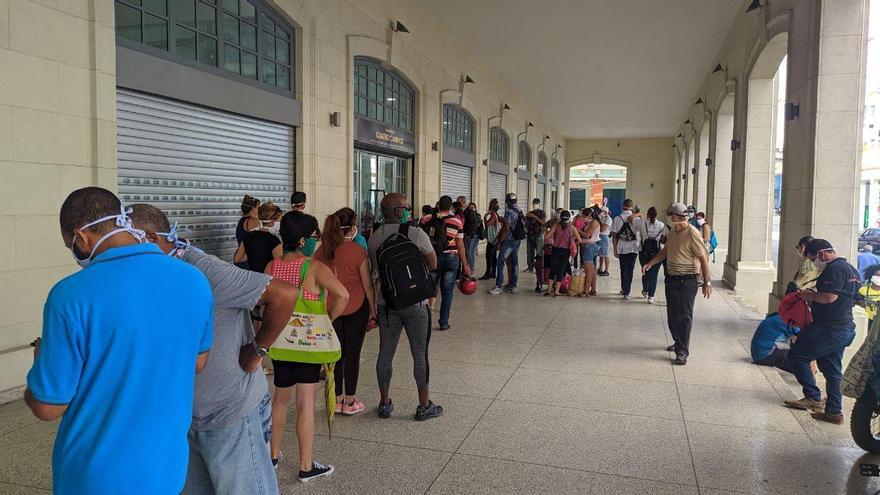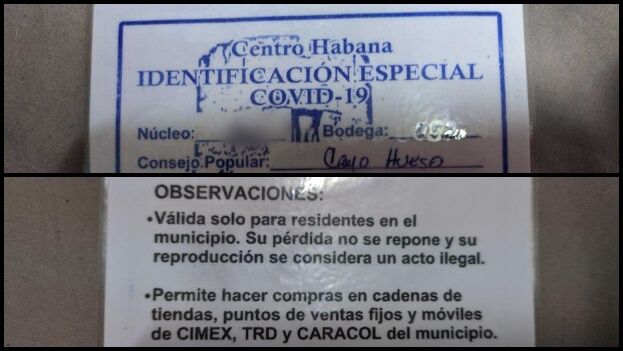
![]() 14ymedio, Marcelo Hernández, Havana, 13 May 2020 — “Without the ration card they won’t give me the card,” Osmany laments outside a store on Calle Neptuno, in Central Havana. This 39-year-old electrician, originally from the province of Guantánamo, has no legal residence in the capital and, with the coronavirus crisis, he can no longer buy in state businesses in his Cayo Hueso neighborhood.
14ymedio, Marcelo Hernández, Havana, 13 May 2020 — “Without the ration card they won’t give me the card,” Osmany laments outside a store on Calle Neptuno, in Central Havana. This 39-year-old electrician, originally from the province of Guantánamo, has no legal residence in the capital and, with the coronavirus crisis, he can no longer buy in state businesses in his Cayo Hueso neighborhood.
Presenting the “Covid-19 Special Identification” card, on letterhead with a stamp and the address of the house, is the new requirement to be able to purchase products in the state stores of numerous neighborhoods in Central Havana. But the document is only delivered to an entire family and upon presentation of their ration book. In one of the areas of the country with the most “illegal” people, meeting that condition is almost impossible for many, as Cubans from other provinces are not permitted to freely move to the capital and establish residence.
“I am here waiting for someone to sell me the right to use their card,” Osmany explains to 14ymedio. “But not many people are willing to do that, because they write down the number and if I buy chicken in this market with someone else’s card, then they can no longer buy the same day.” Although he admits that “someone always appears who has the card but does not have money and those are the ones I am looking for.”
“Its loss will not be replaced and its reproduction is considered an illegal act,” says the cherished card on the back. “But there’s no warning on it that you can’t lend or rent it, so I’m not committing any crime at the moment,” Osmany adds. “At least with all this pandemic, the police have stopped arresting the ‘illegals’ in Havana, which is something.”

Spending more than 72 hours in Havana without having a legal residence is cause for deportation to one’s province of origin. Before the coronavirus, several transports departed from Havana every week that distributed the “illegals” to their territories of origin.
“I never thought I was going to regret that they didn’t arrest me, but right now if that option existed I would be going back to Guantánamo, because at least there I have family with a piece of land that produces some food, but here I have nothing.” For the first time since he has had the use of reason, Osmany does not want to “live in Havana” but would like to return to the place he left in mid-2019.
Finally after a long wait, an old woman approaches him to ask if he wants to use her card in exchange for two cans of sardines. The man from Guantanamo sees the skies open, although both still have to wait in the line for four hours to be able to close the deal and each one leaves with something in their bag. “Whatever they ask, you are my grandson,” warns the lady before the eyes of the police who watch the line.
As of May 10, Centro Habana had 102 confirmed cases of Covid-19, a rate of 74.9 per 100,000 inhabitants, according to the local newspaper Tribuna de La Habana. In the official media they tell people to keep their distance and avoid leaving the house, but the lines to buy food start at dawn and are often chaotic and disorderly.
The authorities of Central Havana, aware of the presence of many residents who do not have a Havana address on their identity card, claim to have enabled the delivery of the purchase card even to those who do not reside there legally, but the procedure is cumbersome and implies that there are neighbors who offer themselves as witnesses and the Committees for the Defense of the Revolution serve as guarantors for these people.
“I’ve only been living here for two months and almost nobody knows me in the neighborhood, I still have my ration book in Artemis, which is where I come from and now I can’t go there to get my ration shares from the bodega and I can’t buy in any store either here,” explains Yasmary, another resident in Centro Habana trying to buy the right to use a card.
Yasmary managed to pass the barrier and the police cordon on Monday, which, at the corner of Belascoaín and Neptuno, marks the closure of the quarantined area. From there, he went to the Plaza de Cuatro Caminos, a large shopping center that now barely provides collection services for products purchased through the unpopular online TuEnvío platform. “I made the purchase on April 23 and it still hasn’t arrived.”
The line for pick-ups goes around the imposing building, which reopened last November, although on its first day it was the scene of a such massive brawl to reach the unusually well-stocked shelves that the authorities immediately temporarily closed it again. Now, the large entrance gates are again closed and the people who stand at the entrances are just trying to pick up the food and toiletries they bought from the online store.
“At least for this I don’t have to show any card, so I’m staying here until they give me my package,” concludes Yasmary. Several police officers try to organize the line and ask customers to show them their purchase orders. Without documents, today it is almost impossible to get one’s daily meal in Central Havana.
______________________________
COLLABORATE WITH OUR WORK: The 14ymedio team is committed to practicing serious journalism that reflects Cuba’s reality in all its depth. Thank you for joining us on this long journey. We invite you to continue supporting us by becoming a member of 14ymedio now. Together we can continue transforming journalism in Cuba.
